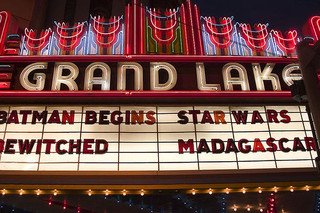 We all know that initiation into Christ is a gradual process. But while we know that in our heads, we don’t always know it in our hearts. I think some of the reason for that is modern storytelling. If you think of stories from 19th century literature such as Jane Eyre or Wuthering Heights, the action unfolds slowly and gradually. As we moved into the 20th century, life began to speed up, and so did our storytelling. Life itself moved faster and the storytelling media shifted from books and stage plays to movies and television.
We all know that initiation into Christ is a gradual process. But while we know that in our heads, we don’t always know it in our hearts. I think some of the reason for that is modern storytelling. If you think of stories from 19th century literature such as Jane Eyre or Wuthering Heights, the action unfolds slowly and gradually. As we moved into the 20th century, life began to speed up, and so did our storytelling. Life itself moved faster and the storytelling media shifted from books and stage plays to movies and television.
This new, faster storytelling required a more of a blockbuster, edge-of-your-seat style. The rise of the Internet, smart phones, and tablets have only increased the speed at which we tell our stories. On Twitter, you have 140 characters to make your point. On Vine, you have six seconds to tell your story.
There are no cliffhangers in the RCIA
When seekers come to us, we are heavily influenced by the way the rest of the world tells stories. We have an expectation (sometime an unconscious expectation) that the seeker’s story will be resolved quickly and perhaps dramatically. We perhaps expect their journey to be more like Rocky and less like Sense and Sensibility.
The problem here is obvious. Real stories in real life take time to unfold. When a seeker encounters Jesus for the first time, the result is seldom instant conversion. There are “knocked-off-your-horse” stories of conversion, but they are rare. (Even St. Paul did not actually fall off his horse!)
Most seekers have already been on a journey
It is more often the case that a seeker has been seeking for some time. They may have read philosophy or dabbled in other religions or simply tried living an ethical life. However, every path they tried has come up short. That’s how they found their way to us. They are seeking something, but they don’t yet know what or who it is.
That’s the case for a lot of seekers, anyway. Other seekers will be farther along on their journey. The will have encountered Christians and even begun to live as Christians do. Some will have read the Bible or will have participated in Mass.
RCIA teams discover stories
The point is that every seeker has a unique story. Our job as RCIA team members is to discover that story and begin to tell our own stories—which will include the story of Jesus.
RCIA teams discern the will of the Holy Spirit
As we grow in our relationship with the seekers, we also have the responsibility of discerning the will of the Holy Spirit for each individual. The Spirit has a unique call and a particular path for each seeker. We cannot rush it or fit it into a predetermined schedule.
RCIA teams celebrate the journey with rituals
Finally our job is to set out milestones along the path. Each spiritual journey will include a series of stages. Some of those stages will be marked by symbolic rites. These rites are, themselves, part of the story. They are formal affirmations of the seeker’s growing relationship with Jesus and the church. Here, too, we have to be careful of our expectations. We can sometimes begin to think we are in charge of these rites. We might think it is our job to schedule and manage them. In some ways that’s true. But the actual person in charge is the Holy Spirit. The rites of the initiation process are always subject to the growth of the seeker’s life in the Spirit.
While we may all agree that the journey of faith is a gradual process, we have to ask ourselves what a gradual process actually looks like. While it is normal to have Great Expectations for our seekers, we have to be careful not to let their journey become too Fast and Furious.
Your thoughts?
How do you gather the stories of seekers in your RCIA process? How do their stories influence the way in which you accompany them on their faith journeys?
![]() Check out this webinar recording: “Is your RCIA process slow enough? “ Click here for more information.
Check out this webinar recording: “Is your RCIA process slow enough? “ Click here for more information.







